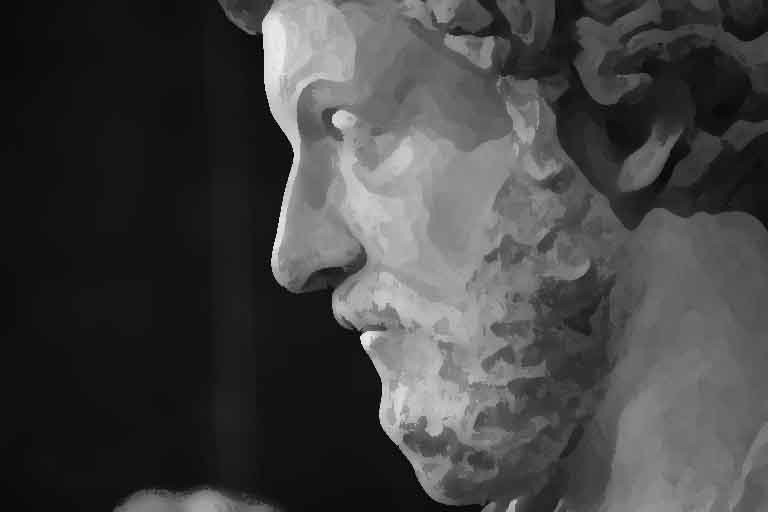
?A Stoic is someone who transforms fear into prudence, pain into transformation, mistakes into initiation, and desire into undertaking.?
– Nassim Taleb
I first found Stoic philosophy by chance around 10 years ago when I picked up a copy of Philosophy For Life and Other Dangerous Situations.
The first thing that stood out was its refreshing honesty, direct approach and practicality for everyday life. With a focus on dealing with hardship, taking personal responsibility, and reducing stress and suffering.
My bookshelves up to that point saw an increasing number of ?self-help? books that promised happiness, confidence, peace of mind, etc. If I?m honest, most of them were BS. However, in Stoicism and the stoic philosophers, was a 2000 year old philosophy that added more value to my life than all of the other books and their combined pages.
Since then, it?s grown into the foundation of my personal philosophy I use day to day.
So what is it?
Definition of Stoicism
The Founder of Stoic Philosophy:
Stoicism is a school of ancient philosophy of life founded around 300BC by a man called Zeno of Citium.
Zeno was a former merchant who was lucky enough to have lost everything he had in a shipwreck before becoming a student of the Cynic school of philosophy.
I say he was lucky because through this temporary adversity he became the founder of one of history?s greatest philosophies. The name Stoic comes from the Greek word for porch ? Stoa.
When the Stoic founder Zeno began his school of thought he did not have the money to buy a building. Plato had his academy, Aristotle had his Lyceum, but Zeno?s followers met to discuss their philosophy on the streets of Athens under the shade of the Stoa Poikile, a colonnade decorated with mythic and historical battle scenes, on the north side of the Agora in Athens. Anyone was welcome to listen and debate ideas, creating the very first group of Stoics.
Stoicism & Happiness:
The philosophy is one of practicality, and focuses on the question: How can we find a path to happiness (which the stoics called eudaimonia)?
It was a philosophy for the everyday men and women of the world, not just for educated aristocrats or isolated philosophers in their halls of books, and sages up their mountains.
For the Stoics, their practical path to eudaimonia (happiness) is grounded in a few core principles:
- The ability to view ourselves, the world, and it?s people objectively and accept their nature as it is.
- The discipline to prevent ourselves from being controlled by the desire for pleasure or the fear of pain and suffering
- Making the distinction between what is within our power to influence, and what is not. Using this information we act on what can be acted upon, and we dismiss what can?t.
The People?s Philosophy:
Stoic philosophy was used by anyone from the soldiers of the ancient world, all the way up to the emperor Marcus Aurelius himself. Growing to become one of the most prominent philosophies of Greece and Rome. In fact Stoic philosophy was only truly rivalled, and eventually overtaken, by Christianity.
So why was Stoic philosophy so popular amongst such a wide range of people? In two words ? It Works.
This was a time when war, famine, exile, death, disease and many more external threats were far more common than they are now. The potential for suffering was huge, specifically suffering caused by external events. And these are exactly the situations in which Stoic philosophy thrives.
The Stoics teach that we are not disturbed by events, only how we respond to them.
They also teach that there is very little inside our control. Merely our thoughts, beliefs, perceptions and actions. That?s it.
These two ideas are important for a number of reasons.
- Firstly, it instructs us to take responsibility for how we view things, because this is the true cause of suffering. Rather than just blaming the world or other people for our shitty situation or our crappy mood, we are empowered to accept that it?s us who create our happiness. No one else.
- Secondly, it draws a line between what we do and do not have control over. Many people suffer because we get upset about, or try and control the things in life that we have no control over. And, of course, this leads us to feel helpless, ineffective, powerless, bitter, resentful. We suffer.
- However, when we focus on what we can control, we start to become effective, efficient, we solve problems more easily, we suffer less. The key is to accept that there is very little within our control, and focus of effort is that small patch of land that we own. Our thoughts, our actions, our perspective and our beliefs.
I have put together a foundation here at Orion that structures ideas from Stoic philosophy (and some from other places), specifically designed to create a framework for a positive and resilient state of mind.
Follow the link below to find out more.
Stoic Philosophy Practices:
1. The Dichotomy Of Control:
?To achieve freedom and happiness, you need to grasp this basic truth: some things in life are under your control, and others are not.
Within your control are your own opinions, aspirations, desires, and the things that repel you. We always have a choice about the contents and character of our inner lives.
Not within your control is literally everything else. You must remember these things are externals, and none of your concern.?
-Epictetus
The concept of control is a core of practical Stoic philosophy, when understood it allows us to clearly see the areas of our life that we are able to influence, and those which are outside the reach of our control. This, by extension, gives us the ability to stop wasting our time and energy on what we can?t control and accept it, and at the same time helps us focus on the areas of our life we can control.
However, when misunderstood this dichotomy of control can create feelings of frustration, helplessness, depression, meaninglessness and bitterness as we try to exert control over external areas of life of which we have no control.
The concept of control is not unique to the Stoics, it has risen its head across multiple cultures throughout history as a method for living a more aware and fulfilling life, from Buddhists, to Hebrews, to feudal Japan and ancient Greeks.
The Stoics believed that a fundamental key to reduce suffering and live a good life, is to make a clear distinction between that which is inside our control and that which is not. As we come closer to understanding this distinction we can begin to focus our energy and time on what we can influence and come to accept what we cannot.
The US Army?s Leadership manual contains the following:
?It is crucial for leaders to remain calm under pressure and to expend energy on things they can positively influence and not worry about things they cannot?
The world?s most successful addiction program shares the same philosophy, Alcoholics Anonymous recite the Serenity Prayer:
?God, grant me the serenity to accept the things I cannot change,
Courage to change the things I can,
And wisdom to know the difference.?
This philosophy has been used time and time again to pull people from the dark corners of their lives, back into the light and is used by the US Army to build leaders. It can just as easily be applied to everyday life to prevent frustration, feelings of powerlessness and to build empowerment and effectiveness. No matter where we are in our path through life, taking responsibility of distinguishing what is in our control and what is not will allow us to see where we can affect change and where we can stop wasting our time. Acceptance and awareness begin to replace complaint and frustration.
Be aware that the only thing we fully control are our beliefs and our actions.
Ask Yourself:
Where in your life do you try and control things outside the reach of your sovereignty?
- The thoughts, opinions and beliefs of other people
- The economy, job market, political climate
- Your body, age, hunger, desire, emotion
Where in your life do you neglect control of things within your sovereignty?
2. Memento Mori
Memento Mori is the practice of contemplating your own mortality, or remembering that one day you will die.
Sounds morbid? I know, but bear with me.
In his letters, Seneca the Younger explains the benefit of meditating on death:
? Let us prepare our minds as if we?d come to the very end of life. Let us postpone nothing. Let us balance life?s books each day?The one who puts the finishing touches on their life each day is never short of time. ?
This idea can seem strange to those who first come across it. Why would you want to think about your own death? In reality, there is a real, practical benefit.
The Stoic philosopher Epictetus recommended that we all remind ourselves that we will die. He did this because when we recognise that our time is limited, we appreciate each moment more intently. When we are with loved ones, we don?t know how many moments like this we?ll have, so we become more present, focused and grateful.
The concept of Memento Mori takes something destructive like death and turns it into a tool to more vividly enjoy life.
The Emperor of Rome, Marcus Aurelius practised Memento Mori to help guide his actions. In his journal, Meditations, he wrote:
? You could leave life right now. Let that determine what you do and say and think. ?
Stoic philosophy does not view death as a painful concept to be avoided. It is seen as an inevitable part of life that should be embraced and used to more fully appreciate life.
Memento Mori helps us prioritise what really matters but reminding us that time is finite.
3. Amor Fati
The Stoics used Amor Fati to accept the world around them and prevent peace of mind being affected by events outside of their control.
Amor Fati translates to the love of fate.
?Frightened of change? But what can exist without it?What?s closer to nature?s heart? Can you take a hot bath andleave the firewood as it was? Eat food without transformingit? Can any vital process take place without something beingchanged?
Can?t you see? It?s just the same with you-and just as vital to nature.?
– Marcus Aurelius
The world is change. Everything that has happened, from the beginning of time has led to you being where you are and who you are. There can be no other way.
Between then and now life has been in constant flux, a sequence of change that can be for the better of for the worse, but it is almost always out of our control.
The Stoics instruct us to love fate. Accept it as a part of life, do what we can with what is within our power and take the rest as it happens. After all, fate has given us the gift of experience.
Amor Fati
Originally published at https://www.orionphilosophy.com on September 11, 2019.


